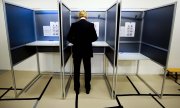Dutch calculate cost of election programmes
In accordance with Dutch tradition the political parties have let the CPB Bureau for Economic Policy Analysis calculate the cost of their election programmes ahead of the parliamentary elections on March 15. Only Geert Wilders' right-wing Partij voor de Vrijheid and the seniors' party 50plus refused to take part. Commentators hail the analysis as a democratic instrument and praise the parties that took part for their transparency.
No such thing as a free lunch
Calculating the cost of putting the parties' election promises into practice is a wonderfully democratic instrument, De Volkskrant comments approvingly:
“The Bureau for Economic Policy Analysis is a voting guide and a fact checker all in one. Will the parties do what they promise to do? What will be the consequences? If parties are forced to decide, what are their priorities? … This calculation paints a frank picture of the political landscape. And the bureau has made it clear that there is a real choice on March 15. … Making the world a better place always comes at the expense of something else. There's no such thing as a free lunch. This brings politics back to its core task: making decisions.”
Say yes to transparency
That two parties refused to let the CPB calculate the costs of their election programmes is incomprehensible, De Telegraaf writes:
“The arguments are familiar: the mathematicians can't factor in immaterial values such as security or preserving identity. Their calculation model is a simplification of the reality. … And what are calculations worth in a country in which more and more compromises have to be made with several parties? This is all true. Nonetheless the calculations at least provide a decent overview of the potential consequences of the parties' plans, and that is valuable information for voters and politicians alike. Naturally the decision on who to vote for requires careful consideration of other factors. But the voters are then ideally equipped to do this before they cast their ballot.”

